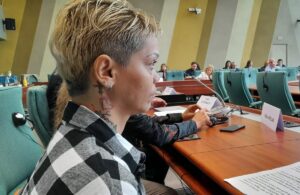
A Romanian woman testifies at the Council of Europe about the traumas she experienced in communist orphanages/ Independent investigations are called for in all EU states on the violation of children’s rights/ „We were kept naked, there was no heating, we received only a little food and we were left in the dark”
Sirmanca Fekete, a survivor of the Cighid home for disabled and mentally ill minors, testified today at the Council of Europe in support of a motion tabled by the Justice Initiative, the association said in a press release.
Urmărește cele mai noi producții video G4Media
- articolul continuă mai jos -
This is a pan-European initiative bringing together 19 countries and is aimed at stopping, recognizing, and preventing abuse of Europe’s children.
The Justice Initiative was initiated by Swiss Guido Flori to investigate and find solutions for those affected by this phenomenon across the continent.
The Council of Europe and member states are called upon to ensure an independent investigation of violations of children’s rights in every European country and official recognition of the trauma of children who have suffered any kind of sexual, physical or psychological violence. The motion also calls for victims to receive some form of compensation and for existing laws in Member States to be geared towards protecting all children from abuse and maltreatment.
The Council of Europe has selected two countries for a hearing that will decide whether the motion goes forward in the European Parliament: Romania and Germany. During the hearing, victims from the two countries were given the opportunity to testify before the joint committee and draw attention to the urgency of their situation.

„In 1988, when I was 3 years old, I was placed in a home for disabled and mentally ill minors. Even though I wasn’t disabled at all, I was just a little weaker than children my age. But the Ceausescu regime wanted a society full of strong, healthy children. Those who looked weak were not considered useful and were therefore sent to institutions.” Sirmanca Fekete said in her testimony. „This institution called Cighid, with about 100 children, was actually a death camp. Nobody held us or played with us, we were swinging back and forth by ourselves. The nurses didn’t give us clothes, we were naked, there was no heating, we only got a little food and were left in the dark. The worst memory I have is that we children were constantly crying because the nurses left us naked in beds filled with our urine and feces. Many of us were also beaten and raped. That was 33 years ago, but to this day I have nightmares and am very afraid of the dark. Then my daughter wakes me up and tells me that I shout ‘don’t beat me’,” Sirmanca Fekete recounted.
In Romania, the state has not taken any steps to investigate the phenomenon of abuse of children in care institutions. There are no official statistics at country level before 1989, but there are none since, says the Justice Initiative.
Victims of abuse in the child protection system who have managed to survive speak of the horrors they experienced in orphanages during the communist era, but the Romanian state has never publicly acknowledged this dramatic episode in our recent history.
The Justice Initiative was launched by victims’ groups, academics and NGOs from across Europe as a joint political initiative that looks to the past, but above all aims to have an effect on the future. In Romania, Gabriela Lupea, project manager at Phoneo Association, together with civil society partners, have joined the initiative.

Donează lunar pentru susținerea proiectului G4Media
Donează suma dorită pentru susținerea proiectului G4Media
CONT LEI: RO89RZBR0000060019874867
Deschis la Raiffeisen Bank


